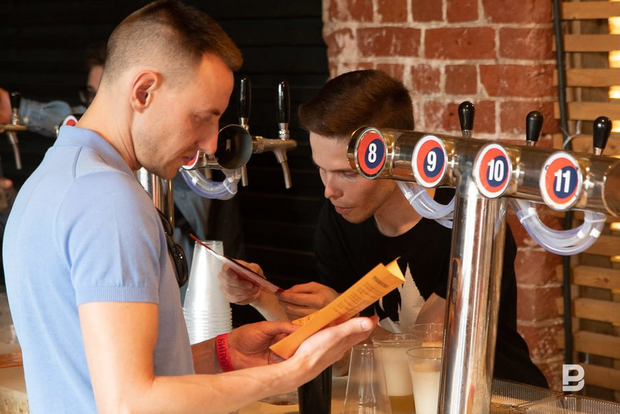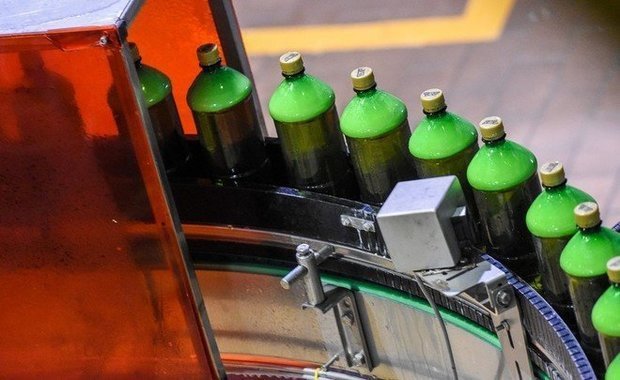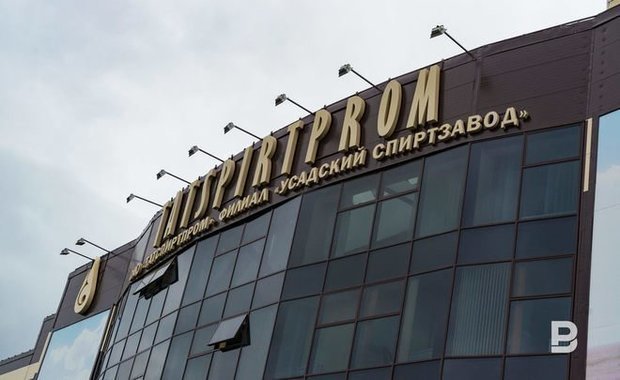Tatarstan refuses to cancel labelling of beer in favour of Chestny Znak
Producers of foamy drink in the Republic of Tatarstan will have to pay twice for the product turnover control system

The Tatarstan authorities do not intend to curtail the experiment on regional labelling of beer products in kegs, despite the upcoming introduction of the federal beer labelling “Chestny Znak”. This was stated to Realnoe Vremya by the deputy head of the State Alcohol Inspectorate of the Republic of Tatarstan, Rustem Arslanov. To avoid duplication of data in the field of beer turnover control, the federal operator tried to persuade the republic to cancel the regional labelling system, but did not receive consent. The reluctance of the republic is associated with the risk of falling excise duties, since Russian labelling does not ensure the traceability of alcoholic beverages, the inspection explained. Brewers themselves are shocked — they will have to fork out twice: both for Tatarstan and federal labelling.
Will Bolivar carry double?
The alcohol market of Tatarstan froze in anticipation of shocks from the introduction of the federal beer labelling system “Chestny Znak”. From April 1, 2023, the operator of the Centre for the Development of Advanced Technologies system is preparing to launch digital labelling first of beer kegs with a capacity of 30 to 50 liters, then — from October 1, 2023, switch to labelling glass and PET containers from 0,5 to 1,5 liters. It is planned to complete this company by digitising the “smallest” — beer in aluminum cans with a capacity of 0,25 liters. The agreement on the phased introduction of beer labelling was reached by the Ministry of Industry and Trade of the Russian Federation, Centre for the Development of Advanced Technologies, and the three largest brewing companies in Russia — Heineken, AB InBev Efes and Baltika. In other words, from April 1, 2023, it is likely to become mandatory for all participants of the beer market.
The federal innovation has stirred up the Tatarstan market not because of fear of strengthening control over the turnover of beer. It's just the opposite: an experiment on voluntary labelling of beer products in large containers (kegs) is already operating on the territory of the republic. It was introduced two years ago by order of Prime Minister of the Republic Aleksey Pesoshin. The labelling of beer kegs is carried out with the help of special stamps that Goznak produces. And the data themselves are entered into the USAIS system. This control scheme covers the entire distribution chain from production to a retail outlet in Tatarstan. Currently, more than 69 large enterprises that have signed agreements on participation in the experiment are participating in the experiment.
It is Tatarstan's voluntary labelling that turned out to be, to put it mildly, an obstacle to the introduction of the federal Chestny Znak system. After all, with its introduction, brewers in the republic are waiting for double levies: on the one hand, the manufacturer must paste a Tatarstan paper stamp, on the other — a federal digital stamp. Otherwise, how to “get along” in one region?

Moreover, the timing of the transition to the digital marking of Chestny Znak has been finally established, and it seems that there will be no rollback. According to market participants, the federal operator has repeatedly postponed its introduction for various reasons: beer labelling could have been introduced this year, but postponed. So the arrival of Chestny Znak will be a prologue to unprecedented double marking — regional and federal.
Unrest on this subject has not subsided for the second week, since double control will automatically lead to additional costs along the entire chain of beer sales, market participants say. Some suggest that in the end they will leave the federal operator, which was supported by large multinational corporations, and the republican experiment of voluntary labelling will be closed.
“If the Turkish producer AB InBev (it accounts for almost 30% of the beer market of Tatarstan) supported Chestny Znak, then maybe the Tatarstan labelling will fall to pieces," brewers suggest. “So under whose 'banners' should we stand — for the 'reds' or for the 'whites'? After all, Bolivar can't carry double. Which marking system should they join?
Tatarstan will not yield
Doubts were dispelled by the deputy head of the State Alcohol Inspectorate of Tatarstan, Rustem Arslanov. He told Realnoe Vremya that Tatarstan would keep the regional experiment on labelling beer kegs despite the introduction of Chestny Znak system.
“We insisted that the republican labelling system continue. And our president supported us. Therefore, we continue the experiment," Arslanov said.
The main argument in favour of the Tatarstan experiment is its effectiveness in whitewashing the domestic beer market. According to Rustem Arslanov, during the two years of the project's implementation, the annual volume of legal excise beer grows by 6-7% a year, which leads to an increase in excise revenues to the budget:
“In 2020, the volume of sales increased by 7% to the level of 2019, 21 million dal of beer were sold. In 2021, sales increased by another 6% to the level of 2020 — this is 22,3 million dal of beer. In the first half of 2022, 10% more has already been sold than in 2021," he said. “Thus, the republican labelling system has proved its effectiveness.

Secondly, the republican experiment is supported by multinational and Russian companies: “Although the experiment takes place only on the territory of Tatarstan, all bona fide manufacturers take part in it," Rustem Arslanov noted. “AB InBev Efes, Baltika Efes, Heineken, Zhiguli Beer participate in it. In total, 69 foreign and Russian beer producers from more than 20 regions, including Moscow and St. Petersburg, participate in the experiment.” However, excise taxes on beer in the republic have fallen this year anyway. According to the Ministry of Finance of the Republic of Tatarstan, 5,788 billion rubles were collected in the first half of the year, which is by 355 million rubles less than in the same period of 2021 (6,143 billion rubles — editor's note).
Why Tatarstan asked to cancel its experiment
It turned out that during the preparation of the introduction of federal labelling, the operator of Chestny Znak offered the authorities of Tatarstan to cancel their experiment. But they didn't get the consent. The president of the republic spoke in favour of maintaining the regional control system.
“Tatarstan was approached so that we would cancel the labelling, so as not to duplicate it. But we are still categorically against the cancellation," said Rustem Arslanov, the deputy head of the State Alcohol Inspectorate of the Republic of Tatarstan.
He explained the rigidity of Tatarstan's position on market retention by that the weakening of control would lead to budget losses. “In fact, we would agree [to cancel] the republican experiment if we saw the effect of this [Russian] labelling," the source explained.
The main drawback of the federal labelling, according to Arslanov, is that the application of a digital code does not ensure the traceability of beer products during its sale, that is, it does not leave a digital trace from the manufacturer to the point of sale: “This is purely statistical labelling. There is no traceability in their system, it does not give anything for control," he explained. In this sense, according to him, the federal system cannot duplicate the Tatarstan one, since their functional capacities are completely different.

“DataMatrix code does not provide traceability in beer sales”
“We replied that we are not against their system, we agree not to duplicate each other, but only when we see that it works in full and the traceability of alcoholic beverages through the DataMatrix code is preserved," explained Rustam Arslanov. “Then we are ready to consider the issue of cancelling our labelling. But for now, that's still a long way off. It is important to maintain control over the turnover of alcoholic beverages. It is not necessary to do this through the USAIS, but it is important to do it. Of course, if through the Unified State Register, it is better and more reliable. But the fact remains: a label is stamped, and that's it — it's unclear to whom the bottle was sold. Neither the distributor, nor the wholesaler, nor the retailer are known.”
However, the interlocutor of the publication admits that in the future the operator will correct the shortcomings: “Duplicating is, of course, wrong. But there is nothing yet. According to him, negotiations with the federal operator to finalise the system are underway, but there are no specific deadlines: “We discussed the timing of returning to the topic. They wrote a letter saying that as soon as they say that the system is ready for full traceability, we will be ready to consider it. It is important for us to ensure control over the sale of products, and then it does not matter — through your line or through our system. The main thing for us is to have order," Rustam Arslanov assured.
“Digitising” all market participants without additional costs
Realnoe Vremya sent a request to the operator of Chestny Znak system, the Centre for the Development of Advanced Technologies, with a request to express its position on the issue of double labelling of beer in Tatarstan, but the operator said that he would refrain from commenting. The response of the Ministry of Industry and Trade of Russia has not yet been received by the editorial office.
Meanwhile, the illegal turnover of beer in Russia has reached 16,6%, data are given in the National Scientific Centre of Competencies in the Field of Combating Illicit Trafficking in Industrial Products” ANO.
“Labelling will automatically control the full volume of production and record sales to consumers at the checkout. Thus, the introduction of labelling will make it possible to “digitise” all market participants without additional costs and control production volumes, which is a prerequisite for paying excise taxes in full," the centre said in a statement.

Now the enterprises are equipped with counters that produce beer and low-alcohol beverages in volumes of less than 300 thousand dal a year, and the rest, which is 90% of the market from the number of manufacturers, independently enter information about their production in the Unified State Automated Information System.
Belyy Kremlin — on the double hook
If Russian beer producers still have the right to choose labelling, then the main Tatarstan brewer — Belyy Kreml beer factory — is facing double control. Konstantin Efimov, the director of the Tatspirtprom project office, confirmed to Realnoe Vremya that the company supported the proposal to start mandatory beer labelling from April 1, 2023 and plans to join it.
“Our company considers reasonable the timing of the introduction of beer labelling and their division into stages, plans to be fully prepared and technically equipped by the entry into force of the law," Efimov explained.
As a result, Tatspirtprom will remain in the regional labelling system and in parallel will participate in the experiment of Chestny Znak to work out the technology of applying the DataMatrix code to the packaging.
The company assures that simultaneous marking with Russian and Tatarstan signs does not entail costs. But they expect that technological equipment for applying DataMatrix codes will be able to be purchased on preferential terms.

It was not possible to find out the position of the second major beer producer in the republic, Bulgarpivo company (the owners are Chuvash businessmen). Earlier, the company was reproached for the growth of debt to the budget of the republic by 131 million rubles. Sources close to the company reported that the debts were repaid the following day.
“Bavaria somehow does without labelling, producing high-quality beer”

Most players believe that labelling is not necessary for manufacturers at all, and regulatory authorities are interested in it, which need additional sales tracking functions. “Bavaria produces high-quality beer and somehow does without them," said Yury Katurin, co-owner of Craft Brew Riot brewery.
“Those who work in the beer market are not engaged in illegal products. We work honestly and do not come into contact with suppliers of illegal products. There is the USAIS system that allows you to fully track everything from and to," says brewer Aleksey Shafler.
He is sure that it is enough to limit ourselves to controlling producers, and not to take millions of market participants on the hook. According to the owner of a well-known beer chain, the growth of sales of the drink in the republic occurs only for one reason — more and more guests and tourists come to Kazan: “If they were not there, then I am not sure that beer had sales at all.”
“Now everyone who wants to return will have to pay twice for labelling," some participants of the beer market believe. “Manufacturers will have to pay 50 kopecks for each container. As a result, labelling each keg will cost twice as much as other manufacturers. Besides, they will have to purchase equipment worth from 10 million rubles. The costs depend on the scale of a business — it will cost millions for someone, and tens of millions of rubles for larger ones. But these are one-time costs. Some people think that you can invest 30 million rubles once — well, that's fine. But there are still fixed costs that have not yet been estimated.”